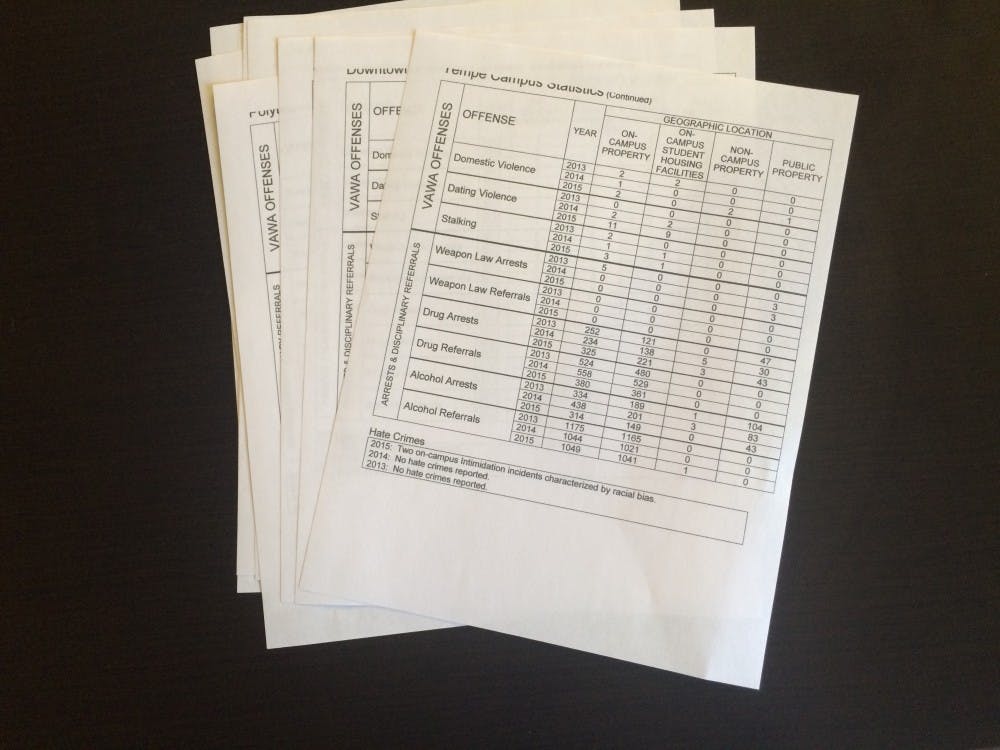It’s your freshman year of college, you’ve dreamed of this day for years, you hear about all the college parties, all the freedom and of course — all the alcohol.
You say to yourself, “I’m in college, I’m an adult, I should be allowed to drink.” You’re having a great time at the party with all that alcohol, until the Arizona State University police show up and your fun night turns into your worst nightmare: A Minor in Consumption (MIC) ticket.
The ASU Police Department has handed out a total of 2,657 MIC tickets in 2013; 2,417 in 2014 and 2,419 in 2015 across Tempe, West, Polytechnic and the Downtown Phoenix campus, according to the ASU Clery report.
These numbers indicate MIC tickets issued on both on-campus property like residence halls and off-campus property.
In 2015, there were 238 less tickets issued compared to 2013, according to the Clery report.
ASU’s Health and Wellness provides e-learning opportunities for students to enhance their awareness of alcohol abuse and related issues.
“ASU wellness programs focus more on how to reduce risk of high risk and underage drinking, and it’s impacts,” says Karen Moses, Director of ASU Health and Wellness.
Moses says Alcohol Wise is a prevention program offered at ASU and Under the Influence provides alcohol education for students who have violated ASU’s alcohol policy.
“Students who receive an MIC may be referred to ASU’s Office of Student Rights and Responsibilities and may be required to take an alcohol education class, depending on the situation they were involved in,” Moses says.
More programs that ASU offers for alcohol awareness are Living Well @ ASU, The Red Watch Band and The Well Devil Ambassadors, Moses says.
Activities that run late into the evening hours to provide opportunities for students to have fun without alcohol, Moses says.
“Living Well @ ASU discusses wellness and how to set wellness goals and lead a healthy lifestyle while in college, and beyond and includes a section on alcohol use and abuse,” Moses says.
Moses says The Red Watch Program is a program that provides training in CPR and how to identify and respond to an alcohol-related medical emergency, or when someone is passed out from alcohol or other drugs.
The Well Devil Ambassadors are a peer education group who live in the residence housing to enhance the knowledge and practice of wellness among ASU students.
The ambassadors provide educational service about the risks of alcohol and activities to promote healthy norms, Moses says.
According to the Spring 2016 National College Health Assessment, 26.3 percent of ASU students had five or more drinks in a single sitting during the previous two weeks compared to 31.3 percent of the national reference group, Moses says.
“ASU students high risk drinking rates are lower than the national norms,” Moses says.
According to Moses, 24.1 percent of ASU students surveyed reported they had five or more drinks the last time they partied or socialized, compared to the 26.9 percent of the national reference group.
“It’s important for students who are under the age of 21 to know that Arizona is a Zero Tolerance state, and that a minor with alcohol in their system can get cited,” Moses says.
According to Katy Harris, a spokeswoman for the ASU Police Department, ASU police issue the most MIC tickets around holidays and celebrations.
“During that time we typically have more officers on patrol, which may also contribute to why more MICs are handed out,” Harris says.
An ASU student who chose to be referred to as “Alex” says he received an MIC just months before his 21st birthday.
After Alex got his MIC he was subject to an alcohol education class to get the MIC off his record, he says.
“From the class I learned that drinking underage is more dangerous than people think. Alcohol effects your brain and your brain isn’t fully developed until you’re 21,” Alex says.
Not only was Alex humiliated for getting an MIC he also feared that it would affect his chances of future employment, he says.
“Drinking is a great time; however, receiving an MIC is a lot of work with the court and the class is brutally long,” Alex says.
Alex’s advice for underage college students is to just wait, he says.
“An MIC ticket is not worth that one night of drinking,” Alex says.




